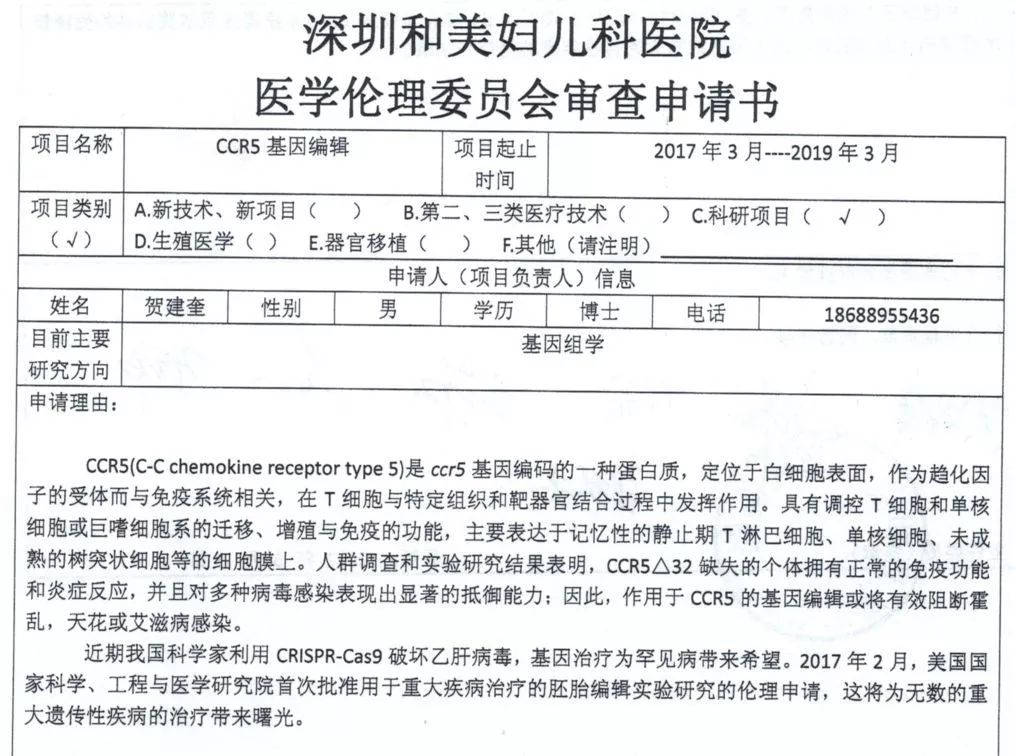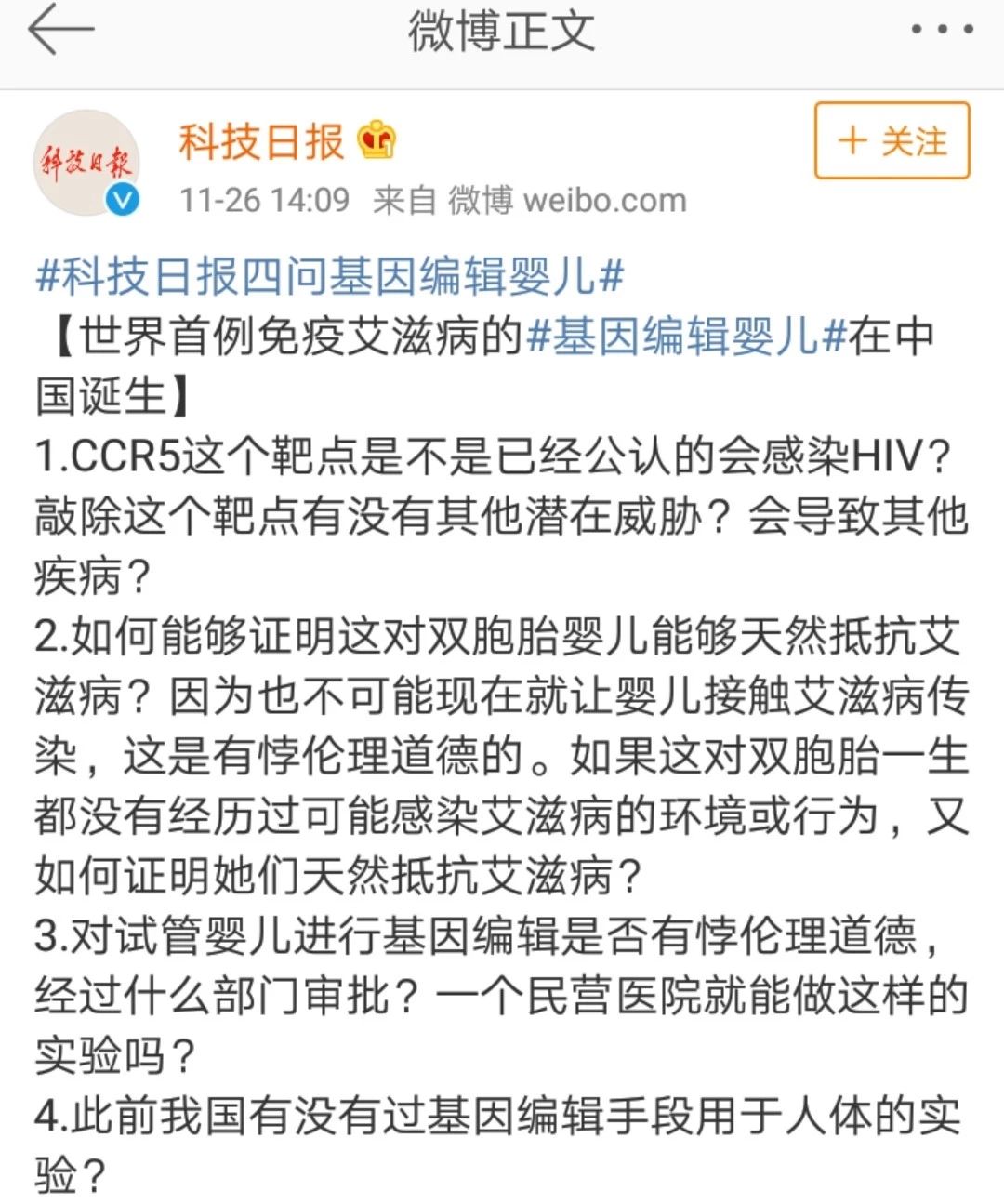People's November 26 report, a pair of genes called Lulu and Nana edit baby has been born healthy in November in China, the news sent shock caused by academics, then, involving multiple parties are denied involvement. At the same time, 122 scientists have issued a joint statement today condemning the first immune AIDS gene editor.
November 26, scientists announced that the South University of Technology Hejian Kui, a pair of gene-editing infant named Lulu and Nana was born healthy in November in China.
The genes of the twins have been modified to make them naturally resistant to AIDS after birth. If this news is true, this is the world's first genetically edited baby that is immune to AIDS. It also means that China has made a historic breakthrough in the field of disease prevention technology for gene editing.
â– Gene editing baby's birth
According to documents published online this month by the China Clinical Trials Registry, the He Jiankui team has been recruiting volunteer couples to create the first genetically edited babies.
In this study, He Jiankui's team first achieved in vitro fertilization of human embryos through assisted reproductive technology, followed by genetic editing of the CCR5 gene of fertilized eggs using CRISPR-Cas9 gene editing technology.
CCR5 is a protein encoded by the CCR5 gene that localizes to the surface of leukocytes and is involved in the immune system as a receptor for chemokines.
It plays a role in the binding of T cells to specific tissues and target organs, and functions to regulate migration, proliferation and immunity of T cells and monocytes or macrophage cell lines.
The CCR5 gene is one of the major co-receptors for HIV virus invasion into somatic cells. Previous data show that about 10% of people in the Nordic population have a natural CCR5 gene deletion. People with this mutation can close the most pathogenic HIV infection, so that the virus can not invade the human body, which can naturally infect the HIV virus.
â– Hospital, ethical review signatory, health planning committee, no recognition
In conjunction with the First Financial Report and a copy of the “Shenzhen and Women's and Women's Hospital Medical Ethics Committee Review Applicationâ€, the experiment began in March 2017 and ended in March 2019.



The study intends to use the CRISPR-Cas9 technology to edit the embryos. Through the pre-implantation genetic test and the full-scale detection during pregnancy, individuals with CCR5 gene editing can be obtained, so that the baby can obtain cholera, smallpox or The capacity of AIDS.
According to the Beijing News, Cheng Zhen, general manager of the Shenzhen and Women's and Women's Hospital, said today: "The hospital and Professor He have not cooperated. His experiment has nothing to do with the hospital." Cheng Zhen said that he has never seen He Jiankui, the hospital is facing The incident was investigated.
As for whether He Jiankui is affiliated with Shenzhen and the United States to conduct related research, Shenzhen and the United States said that they "do not understand the situation."
According to the Beijing News, the reporter learned from the Committee of Medical Ethics Experts of the Shenzhen Municipal Health and Family Planning Commission that the trial was not reported to the department before the trial, and the department is meeting to study the matter.
In addition, one of the seven people who signed the "Application" accepted an interview with the First Financial News on the afternoon of the 26th. He said that he did not know about the matter.
“The ethics committee of our hospital was established on May 8, 2017. I am one of the members. However, I did not participate in the meeting involved in this application, nor did I sign it. I don’t know that the IVF has this department. What relationship," the commissioner said.
The date of signature of the Application was March 7, 2017, but the aforementioned signatory stated that it became a member of the ethics committee of the hospital on May 8 of that year. In response to this issue, no relevant parties have responded.
According to the "Application", it was found that at least four of the seven members of the signature had the same name as the doctors of Shenzhen Hemei Hospital, and the other three were unable to distinguish because the font could not be identified.
â–Project research leader
According to relevant information, He Jiankui is currently an associate professor at Southern University of Science and Technology. He graduated from the University of Science and Technology of China, studied in the United States, obtained a Ph.D. from Rice University, and worked as a postdoctoral researcher at Stanford University, where he studied under the microfluidic gene chip originator Steven Quaker.
He Jiankui has a multi-disciplinary background and has achieved a number of research results in the fields of genetic sequencer research, CRISPR gene editing, and bioinformatics.
In 2012, He Jiankui was introduced back to China through the Shenzhen Peacock Project's overseas high-level talent program, and a personal laboratory was established at the Southern University of Science and Technology to conduct research on gene sequencing.
The Bohai Gene Company, which was founded by it, also announced in 2017 that it has successfully developed GenoCare, a third-generation gene sequencing platform with completely independent intellectual property rights. In April 2018, completed 218 million yuan gene desert A round of financing.
The general criticism of the biomedical community
At present, the use of genetically edited embryos to establish pregnancy development is illegal in most parts of Europe and is prohibited in the United States. According to the guidance document issued by the Chinese government on test-tube babies in 2003, this practice is also prohibited.
It is not clear whether He Jiankui has received special permission or disregarded the guidance.
In addition to questioning the ethical approval of this clinical trial, the clinical trial was also questioned by peer experts.
Mr. Sai released a tweet "Fragile Rebound: Genetically Modified Infants Lead to Universal Criticism in the Biomedical Circle", Liu Ying, Research Fellow, Institute of Molecular Medicine, Peking University, and Research Fellow of the Institute of Neuroscience, Shanghai Institute of Biological Sciences, Chinese Academy of Sciences, Qiu Zilong, Chief of Biotechnology Dr. Li Kai, a researcher at the Institute of Zoology of the Chinese Academy of Sciences, and Li Dali, director of the Department of Life Medicine at the School of Life Sciences at East China Normal University, expressed their objections to the trial from various angles.
The relevant leaders of the National Health and Health Commission told Cybertron on the afternoon of November 26 that "based on the scientific judgment of scientists, I fully agree with the position of this article."
According to the researcher of the Institute of Biophysics of the Chinese Academy of Sciences, cypress blue understands that at present, the development of genetic editing technology is short, not mature enough, and there are risks.
Professor Zhang Linqi, director of the Tsinghua University School of Medicine, director of the Center for Global Health and Infectious Diseases Research and Tsinghua University, Tsinghua University believes:
1) It is irrational and unethical to edit CCR5 for healthy embryos. We have not found that any Chinese CCR5 can be completely missing;
2) CCR5 is important for the function of human immune cells;
3) Due to the high degeneration of HIV, other receptors can be used, and the CCR5 gene knockout cannot completely block HIV infection;
4) CCR5 editing cannot guarantee that 100% will not be used for people before it is wrong.
5) Now maternal and child blocking technology is very effective, up to 98%, can prevent newborns from being infected with AIDS;
6) HIV-infected fathers, and healthy mothers, 100% can have a healthy and lovely child, without having to edit CCR5 at all.
In response to this problem, the Science and Technology Daily also published a microblog called "Four Questions Gene Editing Baby".

â–94.78% of HIV carriers support gene editing technology
Different from scientists widespread opposition stance, there are 94.78% of people living with HIV gene editing technology support for the prevention of HIV.
Not long ago, a research team at Sun Yat-sen University released the first domestic comparative report on gene editorial cognition for the general public and HIV carriers. Over 60% of respondents were positive about the use of gene editing technology.
575 parts by HIV carriers questionnaires showed that 94.78% of the HIV gene carriers support editing technique for preventing HIV.
According to the Pew Research Center in April 2018 for the 2537 survey of American adults showed that 60 percent of Americans support for gene editing of unborn babies, that in order to reduce the risk of serious disease, is a genetic editor An effective medical tool.
Earlier, He Jiankui himself said, "According to Darwin's theory of evolution, life has evolved for billions of years. But in recent centuries, industrialization has completely changed the environment and presented enormous challenges to human beings. In this case, Humans can use powerful tools to control evolution by correcting disease genes... We humans can live better in a rapidly changing environment."
â– huge ethical controversy
In response to this, DeepTech Deep Technology commented that this is not a simple somatic cell editor, but an irreversible edit that can affect germline evolution with germ cells, inherited to offspring.
What is ethical? This is a problem that cannot be solved by hanging on the chest of all scientists.
Is it moral if a baby can make a decision for him when he can't decide his own destiny, but he can't share the risks he might face?
If you know that a method may change the fate of a family genetic disease baby, but turn a blind eye, it must be considered moral ambiguity?
But if you open the human embryo gene editor, is it a threat to raise the starting line to the fertilized egg stage? If parents have more wealth and rights, it will mean that their children have more opportunities to “edit†to choose better qualities.
Regarding the current imperfect regulations and inadequate supervision, the relevant operators of the trial will face the problem of punishment. The relevant leaders of the National Health and Health Commission told Cybertron that “I am attending the 2nd International Conference on Genetic Editing in Hong Kong. I will discuss it this afternoon."
At the same time, @intellectuals also released a joint statement of 122 scientists today, saying that Pandora's Box has been opened, and we may have a chance to shut it down before it is irreparable.

Natural Prebiotic Soluble Dietary Fiber,Prebiotics Fructo-Oligosachharide,High Quality Fructo-Oligosaccharide
Qingdao Bailong Huichuang Bio-tech Co., Ltd. , https://www.qdblcycn.com